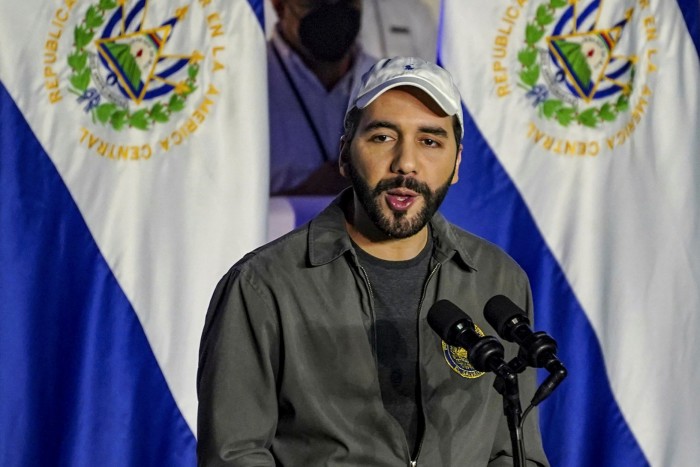Josué País, owner of an El Salvador taxi business that accepts payments in bitcoin from the tourists who use the service, is enthusiastically backing the country’s latest plan to cash in on the cryptocurrency craze.
“The curiosity is what gets me,” said País, 36, who was planning to buy about $200 of the central American country’s “bitcoin bond” set to launch this week. “Number one, I’m going to do it to support the country. Number two, because it’s a big, attractive bet.”
The country’s millennial president Nayib Bukele is relying on interest in the bitcoin-backed bond from the likes of País and retail investors worldwide. It was one of the few options left to help bail the nation out of its financial hole, analysts said, but with institutional investors reluctant to participate and the price of bitcoin in decline, the launch may not be a success.
Six months after El Salvador became the first country to make bitcoin legal tender, the government is scrambling for funds to repay and refinance expiring debt. Its sovereign bonds have fallen to junk status in the past year as investors worry that the budget deficit, which the IMF says could reach 5 per cent this year, is unsustainable. The fund has urged El Salvador to revoke bitcoin’s status.
The 10-year bond is a key element of Bukele’s bold economic experiment. He hopes to raise at least $1bn to increase the country’s bitcoins stocks and to finance a new “bitcoin city” near the Honduran border powered by geothermal energy from a nearby volcano. Any additional funds raised could help it avoid a stringent IMF programme or a sovereign debt restructuring, experts said.
“If this is a failure, a lot of doors close,” said Carlos Acevedo, a former president of El Salvador’s central bank. “This issuance is going to define a lot.”
Several institutional investors said they were watching the bond with interest but would not participate, noting that buyers were more likely to be retail crypto investors. Some analysts think the launch will be delayed but Bukele’s tight control of Congress means the relevant legislation can be approved quickly — the bill to make bitcoin legal tender passed in a matter of hours.

For Bukele, the embrace of crypto has produced limited results. The government had argued that El Salvador’s large migrant labour force would find bitcoin a cheaper and better way to send money home. But central bank data showed that just 2 per cent of remittances in January were sent using digital wallets.
Seventy per cent of Salvadoreans have little or no trust in bitcoin and think it mostly benefits foreigners, like the crypto enthusiasts who visit the country, business leaders and rich people, polling by Central American University from December showed.
“I’m not really sure how to use it, it scared me that it goes up and down, it’s very volatile,” said Alejandro Jiménez, 23, who works in a call centre in the capital San Salvador. “It’s a pretty risky bet by our government.”
A senior executive at one bank said fewer than 0.01 per cent of debt payments were being made in bitcoin, while another from a rival said they had seen an “irrelevant” number of transactions.
Tourism remains depressed, with visitor numbers in 2021 well below pre-pandemic years, official data showed. But the government said tourism had increased in November and December and estimated that 20 per cent of transactions in the sector were in bitcoin.
The cost of the crypto experiment, including contracts relating to Chivo — the official bitcoin app which has 2mn active users according to the government — or how Bukele buys the country’s bitcoin have not been made public. Investors trying to understand economic policy seek meetings with Bukele’s brothers, who are key figures in a small circle of decision makers.

“The clearest government policy is opaqueness with public money,” said Ruth López, anti-corruption director at non-profit Cristosal. “Especially in public purchases and the development of the ecosystem to back up bitcoin and the government app.”
The government did not respond to requests for comment on the bitcoin bond. Finance minister Alejandro Zelaya said in an online interview last month that there was “zero per cent” chance of a default on its sovereign bonds and that the crypto bond issuance would comply with “know your customer” rules to prevent money laundering.
Several factors could restrict interest in the bond. With one bitcoin trading at roughly $40,000, the cryptocurrency is about 20 per cent below its level the day before it became legal tender in El Salvador.
The bond sale also comes as cryptocurrency exchanges try to resist pressure to block transactions from Russia, amid concerns that crypto investments make it easier to evade sanctions. El Salvador abstained in a recent UN vote to condemn Russia’s invasion of Ukraine, and Bukele is planning a trip to Moscow in July.
The crypto bond will be issued by state thermal energy company La Geo, according to investors and bankers. Americans will be unable to buy the bonds as they are prohibited from using Bitfinex, the trading platform which will sell them. In El Salvador’s original presentation, it said that investments would be allowed in dollar, bitcoin and tether.
The financial attractions of the bond were limited, analysts said. The bond offers an annual coupon of 6.5 per cent — much less than the yield currently available on El Salvador’s sovereign bonds — plus 50 per cent of the gain in the price of bitcoin after five years. That made it more suited to investors who want to back El Salvador’s broader crypto experiment rather than seek the best profit, said analysts.
“If El Salvador had solid public finances . . . it [the bitcoin bond] could be a different story,” Acevedo said. “Anyone who does a cold analysis will just buy bitcoin directly.”
Additional reporting by Jonathan Wheatley




